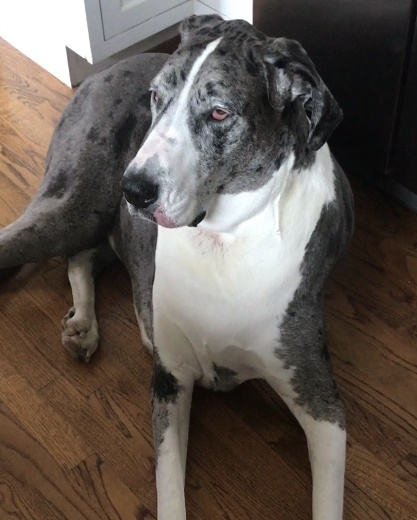This week, we would like to share a guest blog from one of our veterinary clients, Dr. Joel Stone. Dr. Stone is a feline practitioner at All Cat Clinic in Englewood, CO. He received his DVM from Colorado State University in 1990 followed by his PhD from the University of California, Davis in 1995. Dr. Stone has been credentialed to perform VetStem Cell Therapy since 2010. Below he describes his experience with one of his stem cell patients, a cat named Adobe. Adobe was treated under one of VetStem’s clinical research programs for Inflammatory Bowel Disease (IBD).
When I was in High School, I had an awesome teacher named Craig Cogswell. One of the discussions his students would have every week, was to tell the class if anything “Good and New” had happened in the life of his students in the prior week. I am not sure why this has stuck with me for all these years (I am not sure I can tell you about anything else I learned in the class), but I have always tried to appreciate anything in my life that is “good and new.” As a veterinarian, you learn new things almost every day. I want to tell you about a case that I would describe as good and new.
Adobe is an 8-year-old, female neutered domestic medium hair cat that I had initially seen on June 14th, 2016 (when she was 5 years old). Adobe and her owners, Pam and Paul, had come to the All Cat Clinic to get a second opinion on why Adobe would vomit nearly every day. She had been on prednisolone once a day for the previous 2 years to treat inflammatory bowel disease (IBD), but Adobe still was vomiting nearly every day. To be honest with you, this is not necessarily an unusual case. Cats can vomit for many different reasons. After ruling out bacterial, viral and parasitic reasons for vomiting, I started by trying to determine if she had a food allergy that was making her vomit. I asked her owners to feed a sample of a diet called Z/D, gave an anti-inflammatory injection that lasts about 7 days and asked the owners to get back with me in about a week. Her owners said that she did great for about 2 weeks without vomiting but would not eat the Z/D diet. Adobe’s owners are retired and travel frequently so they asked if I could give a similar medication that lasted longer. After performing blood work and a urine analysis to rule out reasons for vomiting that are not related to IBD, I agreed to give an injection of a drug called Depo-Medrol (methylprednisolone). I also suggested another hypo-allergenic diet called the HP diet. After a few weeks, the owners were happy to report that Adobe liked the HP diet and felt it reduced vomiting and along with the Depo-Medrol injection eliminated vomiting for about 1 month.
From a veterinarian perspective, this is good and bad. It is good that Adobe finally had some relief from persistent vomiting, but it is bad that this is a treatment that can cause harm, particularly when given repeatedly. It is known to cause diabetes and a heart condition called hypertrophic cardiomyopathy, that I wanted to avoid. Therefore, I started recommending alternative drugs that reduced this risk, but still relieved the vomiting. The problem I faced was that Adobe does not like to take oral medications. After attempting several alternative medications, we were forced to fall back to giving the injectable drug Depo-Medrol, which we did monthly for about 2 years. Adobe started showing clinical signs of diabetes after receiving steroidal medication for 4 years – 2 years on prednisolone daily and 2 years on Depo-Medrol monthly. Her blood glucose was moderately elevated, and she started having glucose in her urine. Clearly, we needed to do something different.
I had read about a newer treatment involving the use of mesenchymal stem cells (MSC) to treat inflammatory bowel disease that had shown promise. A published paper had shown that 5/7 cats with IBD were significantly improved or had complete resolution of clinical signs whereas the controls had no improvement (1). A canine IBD study reported 9/11 dogs had clinical remission (2). These data support the idea that adult stem cells could provide the immunoregulation necessary to control IBD in cats and dogs.
I discussed this option with Pam and Paul who agreed to let me surgically collect 94.5 grams of adipose tissue from the abdomen and ship the fat to San Diego to process this fat tissue at a company called VetStem. They isolated 25.4 million mesenchymal stem cells (MSC) from the fat I had sent them, then sent these cells a day later to the All Cat Clinic in Colorado to slowly inject the cells intravenously into Adobe. The procedure corresponded with the time that Adobe would have received the Depo-Medrol, which we did not give.
The owners reported that the week following the MSC injection, Adobe’s attitude was much improved. Being the week beyond the time that Adobe usually received the Depo-Medrol, the improvement seen in Adobe’s behavior is significant. Adobe was not acting “sickly”, wasn’t cowering, wanted to be petted by the owners and had a good appetite. Adobe had 3 episodes of vomiting the 1st week following the MSC injection, but these episodes included small amounts of whole food instead of large digested kibble. Starting the second week post-MSC injection, Adobe started showing signs of lethargy, was quiet, and eating less food. On Nov. 14th, a repeat blood panel and urine analysis was performed which was normal, except for mild renal insufficiency. The hyperglycemia and glucosuria was resolved. Subcutaneous fluids, along with famotidine, mirtazapine and Cerenia were given. Adobe was also treated for mild/moderate ear infection and mild conjunctivitis. Adobe responded well to the appetite stimulants, anti-nausea, ear, eye and fluid therapy treatments and a second MSC injection was scheduled.
On Nov. 28th, a second MSC injection was given. Following this injection, Adobe improved significantly. Owner stated that Adobe was acting like a younger version of herself, no vomiting was seen and had a good appetite. Two weeks following the 2nd injection of MSC and 3 months since the last Depo-Medrol injection, Adobe was reported to be doing extremely well. The only major concern was that Adobe’s hair appeared to be thinning. The literature reveals the opposite effect with hair growth usually occurring after MSC injections. It is possible that after such a long period of steroid treatment that hair loss might be a response to withdrawal and subsequent cellular “normalizing” prior to hair regrowth.
Currently Adobe is doing very well. She has not been vomiting for about 4 months. We haven’t needed to treat the chronic vomiting with methylprednisolone (Depo-Medrol) since starting the MSC therapy. Adobe had alopecia/hair thinning for about 2 months after the MSC therapy, but most recently, has regained her normal hair coat.
From my perspective, this treatment can be categorized as “new and good.” It is a little early to know just how good this new treatment modality will be in clinical practice, but as new cases present themselves and we gather more information, my hope is that we will be able to say that MSC treatment is “new and very good!”
1) Webb, TL and Webb, CB. Stem cell therapy in cats with chronic enteropathy: a proof-of-concept study. J Fel Med and Surg (2015) 17 (10):901-908.
2) Perez-Merino E.M., Uson-Casaus J.M., Zaragoza-Bayle C., Duque-Carrasco J., Marinas-Pardo L., Hermida-Prieto M., et al. Safety and efficacy of allogeneic adipose tissue-derived mesenchymal stem cells for treatment of dogs with inflammatory bowel disease: Clinical and laboratory outcomes. Vet J (2015) 206(3), 385-390.


